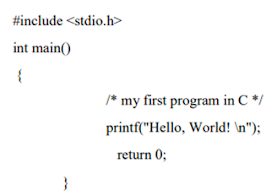Introduction to C:
C
is a powerful, general-purpose programming language that was developed in the
early 1970s by Dennis Ritchie at Bell Labs. It's known for its efficiency,
flexibility, and portability, making it widely used across various
applications.
The Simplest Hello Words program in C can be written as:
- Including <stdio.h> library is necessary to access standard input output functions like printf() and scanf().
- main() is a compulsory function in C
- /*.....*/ is a comment which won't be shown on the terminal
List of most used header files in C:
Header files
in C play a pivotal role in modular programming by providing a way to declare
and define functions, structures, and other constructs that can be
shared across multiple source files in a program.
Library functions:
scanf() and printf()
scanf()
is used to accept values at the terminal from the user and printf() is used to
display values at the terminal
Certain
format specifiers are used while accepting and printing values like:
%d
or %i -- For integers
%f
-- For float values
%c
-- For character values
%s
-- For strings
Example:
To
accept an age, marks, division and name of a student we'd write :
int
age; //declaration
float mks; //declaration
char
div;
char name[50]; //declaration
printf("Enter
age, marks, division and name\n")
scanf(" %d %f %c %s ", &age , &mks , &div , &name );
Here the access specifiers allow us to get the respective inputs



1 Comments
Good job 👏
ReplyDelete